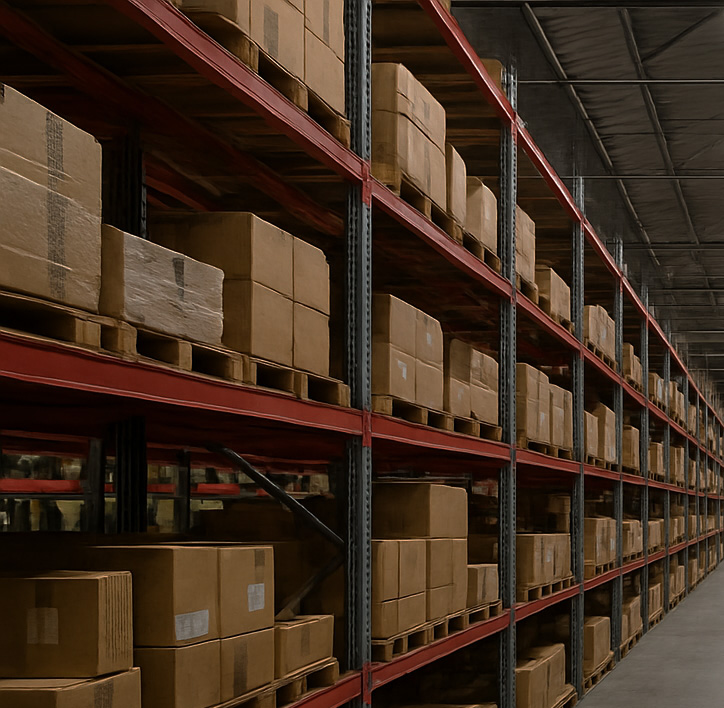
Warehousing is a critical service for manufacturers, wholesalers, retailers, and other companies that need to store material, semi-finished goods, or finished products. Third-party logistics providers (3PL’s) operate warehouse space for businesses. There are two main types of warehousing provided by 3PL’s: shared warehousing and dedicated warehousing. Let’s take a deeper look into these types of warehousing.
Shared Warehousing
Shared warehousing is also known as public warehousing and multi-client warehousing. It is the most common form of business warehousing. It’s called shared because in one warehouse a 3PL hosts goods from multiple clients, who each use the warehouse resources. On-demand warehousing is a specific model of warehousing fulfillment geared to ecommerce that generally takes place within shared warehousing environments.
Overview of Shared Warehousing
In a shared warehousing environment, each client is provided with its own space within the warehouse for the storage of its goods. The space can be arranged specifically to best store particular material or product, but building structural changes are not typical in a shared environment—unless they would be beneficial to a wide swath of clients. Different types of storage equipment (such as racks, pallets, bins) will be used depending on the types of goods being stored.
Key Features of Shared Warehousing
- Lower storage fees, as each client shares in the expense for general packaging, along with lighting and other utilities, alarm systems, labor, equipment, warehouse and inventory management systems, and other overhead expenses
- Variable cost: Cost is dependent upon how much storage space a company has used during the billing period
- Feature common layouts best suited to store a wide-variety of goods across industries or within specific industries
- Flexibility: Flexible, adjustable spacing, short- or long-term leasing
- Scalability: Companies pay for only the space they use, which is ideal for goods that experience seasonal fluctuations; as a company grows/volumes increase, the shared warehouse provider can provide more space
- Docks, equipment, and personnel are shared for the unloading and loading of client goods
Shared Warehousing Is Right for Your Company When:
- Handling and storage requirements for your material or product are fairly standard within your industry, with only certain customizations needed (for the most part) in kitting or packaging
- Compliance and/or security requirements for material handling is also fairly standard for the particular material or product, rather than restricted to your goods
- Your material or product does not require a unique, highly-specialized environment for handling, storage, or customization
- Your company does not have the resources and/or desire to manage the upkeep expense for a dedicated warehouse
- Your company has seasonal fluctuations in inventory
- Your company is just starting out or has just expanded to the point that warehousing is needed
- Your company has limited storage needs
Dedicated Warehousing
Dedicated warehousing, also known as contract warehousing, single-use warehousing, and private warehousing, is warehousing used solely for one client’s goods, or one particular segment of a client’s portfolio.
Overview of Dedicated Warehousing
Dedicated warehousing is the storage of a sole company’s goods in a warehouse facility. Companies with multiple, specialized materials or products may make use of one dedicated warehouse for each specialized good or required process. Some companies own their own dedicated warehouse facility but use 3PL’s to manage the space. Others lease the usage of the facility from 3PL’s who own and operate the warehouse location. At times a company will consult with a 3PL on the design of the dedicated warehouse from start to finish and then use that 3PL to manage the facility operations.
Key Features of Dedicated Warehousing
- Warehouse stores only goods from one client
- Customized layout: Warehouse is designed or arranged specifically to address unique material or product specifications or processes needed to manipulate, finish, or customize goods
- Fixed, higher costs: User of the dedicated warehouse is paying for the entire space—regardless of how much material or product is stored there
- Client has complete control over how space is used
Dedicated Warehousing Is Right for Your Company When:
- Your company needs a significant amount of warehouse space
- Your company needs to own its warehousing space or needs to tightly control its own operational procedures
- Your company needs warehousing space specifically designed to store, handle, and package your specialized material or product
- Your goods require specially trained or licensed personnel to handle and/or secure them
- Your goods require highly-specialized customization not typically available in a shared environment
- Your company has very high-volume demand that might be slowed down in a shared environment (revenue generated by high-demand should offset cost of the dedicated facility)
